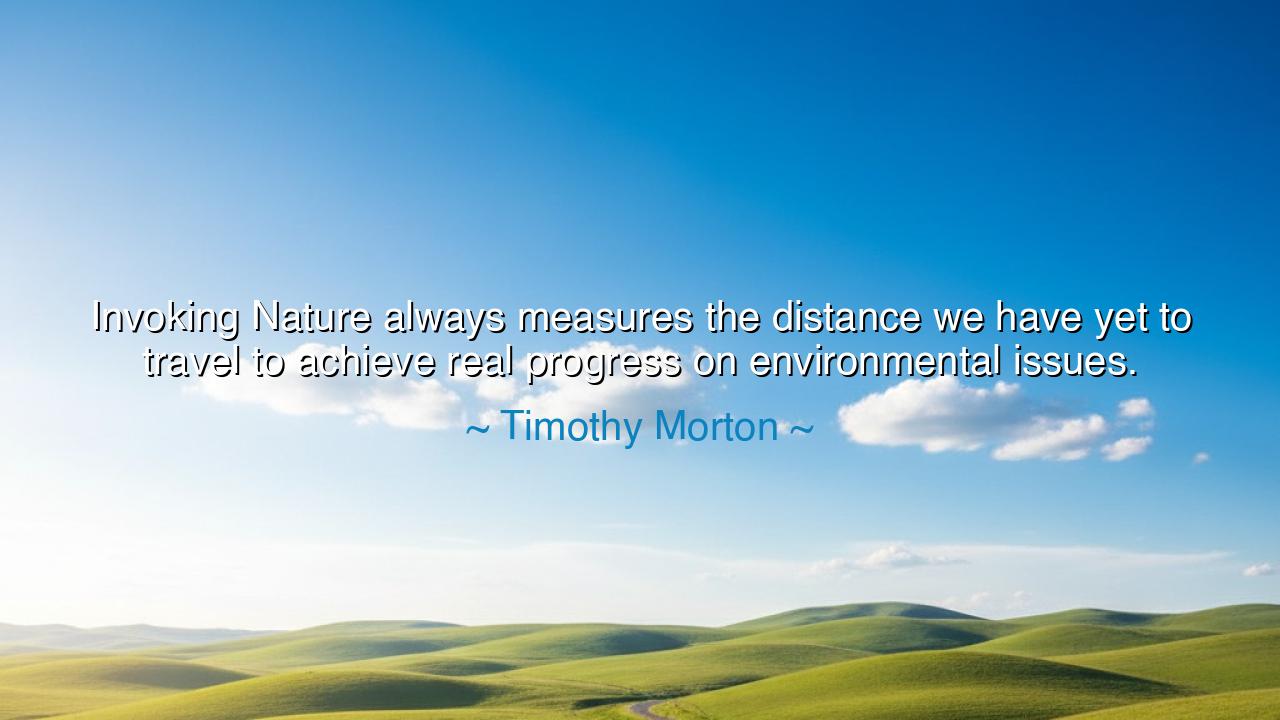
Invoking Nature always measures the distance we have yet to
Invoking Nature always measures the distance we have yet to travel to achieve real progress on environmental issues.






The words of Timothy Morton—“Invoking Nature always measures the distance we have yet to travel to achieve real progress on environmental issues.”—resound like a riddle wrapped in truth. At first glance, it seems an academic reflection; yet within it lies a spiritual mirror held up to humanity. Morton, a philosopher of ecology and art, speaks not merely of the environment, but of our relationship with Nature—a relationship defined as much by absence as by admiration. His words remind us that when we speak of Nature, when we praise her beauty or lament her loss, we reveal not our closeness to her, but the distance we have created. For to “invoke” Nature is already to stand apart from her, to see her as something other than ourselves.
The origin of this quote lies in Morton’s profound philosophical concept of the “ecological thought.” He challenges the illusion that Nature is something pure, separate, and untouched—a pristine ideal we must save. Instead, he argues that Nature is entangled with us, inseparable from our existence, our technology, our civilization. When people appeal to Nature as if she were a goddess outside of us, Morton says, they expose the wound of disconnection that defines modern humanity. To invoke Nature is to measure how far we have strayed from recognizing that we are already part of her, that our bones, our breath, our blood belong to her rhythm. True progress, he teaches, will not come from worshiping Nature from afar, but from rejoining her symphony as a humble instrument within it.
The ancients would have understood this paradox well. The poets of Greece and Rome spoke of Gaia and Terra Mater not as distant beings, but as living presences within every stream and seed. The Chinese sage Lao Tzu taught that harmony with the Tao—the way of Nature—was not a pursuit, but a remembrance. Even the indigenous peoples of the Americas, Africa, and Oceania saw the world as alive and relational, where to take without gratitude was to wound oneself. In contrast, the modern world has built glass walls between humanity and the wild, walls of consumption, control, and convenience. When Morton says that invoking Nature measures our distance, he is echoing the same truth the ancients lived by: we have forgotten that we are Nature.
Consider the story of the industrial revolution, when the earth’s abundance became raw material for ambition. The forests fell, the rivers darkened, the air grew heavy with smoke—and yet, in that same era, men began to speak of “conserving nature.” The birth of environmentalism, paradoxically, arose from the height of alienation. The poet William Wordsworth, wandering the English lakes scarred by progress, lamented how humanity had “murdered to dissect.” His cry was not merely for trees and mountains, but for the human soul that had lost its reflection in them. From his time to ours, each movement to “protect Nature” has been both a noble act and a confession of estrangement—a sign that we must still travel far to reconcile our intellect with our environment, our civilization with our origins.
Morton’s insight strikes at the heart of this struggle. He does not mock the environmentalist’s passion, but deepens it. For he knows that to build solar panels and recycle plastic, while necessary, are not enough if the human mind still sees Nature as a resource or backdrop. The true transformation must happen in consciousness itself. When we no longer speak of “saving Nature,” but of saving ourselves as part of Nature, the distance begins to close. When we stop invoking Nature as an “other” and begin listening to her as kin, progress ceases to be a project and becomes a way of being.
To understand this fully, imagine the reforestation movements in lands once stripped bare. In South Korea after the Korean War, the mountains were barren. Decades of human care—tree by tree—restored their green breath. But the miracle was not in the trees alone; it was in the hearts of the people who remembered that the forest was not something to own, but something to belong to. Their success measured not only ecological recovery, but the healing of relationship—a step closer to the unity Morton speaks of.
The lesson, then, is both humbling and empowering. To speak of Nature is to remember how far we have drifted from her embrace—but also to realize that the path back begins with awareness. We must walk that path not in guilt, but in reverence. Let our progress be measured not by the number of technologies we invent, but by the depth of our participation in the living world. Plant trees not as ornaments, but as acts of kinship. Design cities that breathe like forests, economies that nurture like soil. Learn again to see the divine in the humble leaf, the sacred in the falling rain.
Thus, Timothy Morton’s words become both a lament and a light: a lament for our separation, and a light pointing homeward. The invocation of Nature, he says, is not an end in itself—it is a signpost, reminding us that the work of harmony is not yet done. But the distance can be bridged. Each act of awareness, each choice of compassion, each gesture of humility draws us nearer to the world that bore us. And when at last we no longer invoke Nature, but simply live as part of her, then the long journey of civilization will have found its way back to wholeness.






AAdministratorAdministrator
Welcome, honored guests. Please leave a comment, we will respond soon